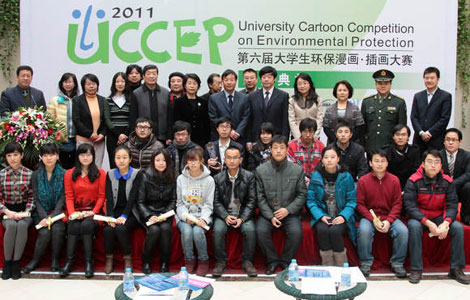Bank reserves 'may be cut again next year'
Updated: 2011-12-26 09:49
By Wei Tian (China Daily)
|
|||||||||||
Move will boost lending but does not mean policy shift: ex-official
BEIJING - The reserve requirement for banks may be further reduced next year to allow more lending but that does not signify a policy change, a former central bank official said on Sunday.
Wu Xiaoling, a former deputy governor of the People's Bank of China, said at a Beijing forum that cutting the requirement would be a major tool in fine-tuning a prudent monetary policy.
"There might be a series of reserve requirement cuts next year if foreign exchange purchases continue to decline, but that does not indicate a change in stance," Wu said.
Reducing the reserve requirement, the amount of money banks must keep to guarantee deposits, makes more money available to lend.
Foreign exchange purchases, the amount of domestic currency issued to purchase foreign currency to maintain a stable exchange rate, consists of foreign direct investment, trade surpluses and foreign capital inflow, much of it speculative.
According to central bank data, China's yuan positions in foreign exchange purchases fell 27.9 billion yuan ($4.43 billion) in November from the previous month, to 25.45 trillion yuan.
This was the second drop in a row and the largest monthly decline since December 2007.
The drop was accompanied by a recent depreciation of the yuan against the US dollar.
Analysts see China's foreign exchange purchases as a proxy for foreign capital entering the country, so they believe the drop in recent months suggests speculators are pulling out funds as the global economy wobbles.
Wu said that the decline showed foreign capital flows out of China were the result of a combination of factors, including investors shoring up their domestic economies and worries over a slowdown in China.
Zhou Jingtong, a researcher with the Bank of China, said the capital outflow was not a major concern.
"The outflow of foreign capital may continue for a while but it is not a long-term trend," Zhou said, adding that the outflow will be corrected because the yuan will appreciate against a weakening US dollar in the long run.
The outflow of foreign capital, analysts said, will create room for the government to ease its monetary policies.
The central bank cut the reserve requirement by 50 basis points earlier this month, the first cut in nearly three years, to ease liquidity as inflation softened.
Wang Tao, head of China economic research at UBS Securities, said in a research note that the next cut may occur before the Lunar New Year, which falls on Jan 23.
"A decline in the trade surplus and capital outflows will not harm lending ability. And a reserve requirement cut by 200 basis points will be enough to generate enough liquidity, even if growth in foreign exchange stalls in 2012," Wang said.
But Wang said the central bank is not likely to lower the interest rate in the coming 12 months under any circumstances, even if the inflation falls to 3.5 percent, as UBS predicted.
"The central bank would manage its monetary policies mainly through adjustment of the money supply and line of credit," Wang said.
A report by Bank of America-Merrill Lynch said that the central bank may cut the requirement three times, totaling 150 basis points, to release 14 percent more lending which translates to about 7.6 trillion yuan.
Meanwhile, China is likely to raise the deposit rate by 25 points and the loan rate by 15 points, the report said.
Related Stories
Banks can do more to help SMEs 2011-09-29 08:12
China raises interest rates amid inflation fight 2011-07-06 19:11
China to scrap 34 bank service fees as of July 2011-03-14 22:05
CBRC to focus on credit, liquidity 2011-01-18 07:44
Borrowing costs to hit two-year high 2011-01-07 08:25
Despite tight credit, banks' profits to grow 2011-01-05 08:07
- High-speed rail to link Shenzhen, Guangzhou
- Daily report on PM 2.5 density soon
- Peninsula, finance top talks
- China to continue tax-cut efforts
- Weak markets pose fund investment risk
- New niche market: Affordable smartphones
- China launches super-speed test train
- PBOC urges less reliance on foreign credit ratings










